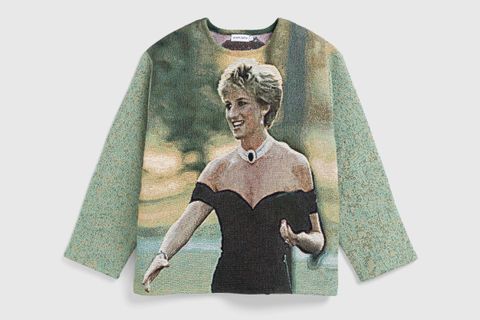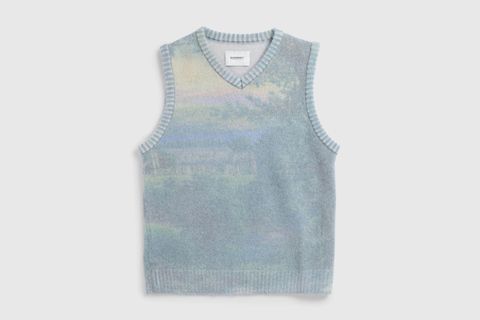Listen Up: Central Saint Martins' Class of 2024 Has Lots To Say
This article is part of Not In London, a multi-media celebration of the English cultural capital. With parties, a pop-up store, brand collaborations, and more, check out everything that's happening right here.
The organized chaos that comes with tight deadlines is palpable when stepping into the studios at Central Saint Martins.
Model fittings are in full flow, shoes are being hand-painted, clothes altered, and the fast-paced patter of sewing machines at work is relentless.
Central Saint Martins' MA Fashion students are busy working around the clock preparing their final year collections before the big moment later this week: their graduate fashion show — presented during London Fashion Week on the evening of February 16 — and subsequent graduate showroom.
Fabio Piras, the MA Fashion Course Director at Central Saint Martins, has experienced the anxiety that comes with a fashion show umpteen times, but even he admits that he's terrified.
Amongst all the bustle in the fashion studio, and there is a lot of bustle, a group of students are kind enough to stop for a moment and provide Highsnobiety with a look at what they are working on.
This new crop of designers is about to present its creative identity to the fashion industry, and it has a lot to say: "There's a huge discrepancy between what young designers think the industry could be and what it is," says Piras.
Below, is an insight into the mindsets of some of fashion's brightest talents, plus a look at their graduate collections.
Gracey Owusu-Agyemang
What's the biggest change you'd like to see in the fashion industry?
Gracey Owusu-Agyemang: I want a lot of focus to be on soil restoration, going back to the roots and knowing that fibers come from the soil. That's what my collection is about, all my garments are biodegradable.
It's something I think people should definitely keep in mind. Not just recycling and deadstock fabrics, but knowing where fabrics are sourced. Traceability, that's what luxury is to me.
Tell me about your graduate collection.
It's very natural. I use hemp and I also use cotton that I have grown from seed by myself. When you see the collection, it's fresh, cool, breathable, and good for the skin.
What's the first thing you're going to do once you've presented this collection?
I need to go into nature, that's what I'm looking forward to: going into nature and clearing my mind.
Maximilian Raynor
How would you describe your graduate collection?
Maximilian Raynor: My collection is an anti-patriarchal protest set in purgatory. I want to take my audience somewhere completely new. I was thinking a lot about otherness and people on the fringes of society, who maybe aren't accepted or don't tick certain boxes.
That's when I developed the Manna for Heaven, it's a play on the term 'manna that fell from heaven,' which is this idea of something unexpected happening when it's supposed to — in a good way. It's all about glamor and romance and storytelling; playing with different symbols of elitism and shredding them up. Taking a pair of shears to privilege, in a way.
What's the biggest change you'd like to see in the fashion industry?
We need more time than just this interview to discuss what needs to change in fashion. But generally, [I'd like to see the industry] appreciating community and teamwork more. I find the lack of crediting slightly odd and that needs to change.
Joshua Ewusie
What's the story behind your graduate collection?
Joshua Ewusie: It's about when my sister would go clubbing and my Grandma would be like, 'you're not cold?' because she would wear a mini dress in the dead of winter. But the cold also represents the harsh hostility that immigrants face when moving to areas like London.
The idea is that the collection starts very covered up and then it gets more and more revealing as it goes through.
What's the first thing you're going to do once you've presented this collection?
Honestly? I just want to sleep and have pizza for the first day. And then we'll think about everything else.
Lovro Lukić
Why did you choose to study fashion design?
Lovro Lukić: When I had to choose what I was going to study, the option was to either do something like economics or do what I was interested in, which was fashion. I was deciding [between the two] and I thought: 'what would David Bowie do?'
What's the biggest change you'd like to see in the fashion industry?
The pace of it. Fashion is way too fast right now and people expect good collections to be made in unrealistic time periods. It'd be better for everyone if the pace slowed down, you would get more interesting products and people wouldn't be overworked.
But this comes with the period we're living in. We want short-term excitement, especially with social media, and it's not a healthy environment for creativity.
What can people expect from your graduate collection?
Nostalgic and weirdly beautiful.
Renato Bras
Who do you look up to in the fashion industry?
Renato Bras: People who come out with ideas that are done with purpose or to change something, rather than for selling. Of course, commerce is important in this industry, but when it seems like that's the focal point... I don't look up to those people.
How do you describe your graduate collection?
Imagine being at the beach in winter. In a warm country, so it's warm enough to be wearing perhaps a T-shirt and a bomber jacket but you also wan to go in the water with your feet. That's what the collection is about.
What's the first thing you're going to do once you've presented this collection?
Hopefully go to the beach.
Traiceline Pratt
Tell me about your graduate collection.
Traiceline Pratt: It's something that fashion needs right now.
People are tired of seeing fake realities. People need to see themselves in clothing rather than false perceptions.
Are you optimistic about the future of fashion?
The people that I surround myself with, I feel as though those people have something new to say and are something that fashion needs. Because of those people, I am optimistic about what fashion has to offer in the future.
Dhruv Bandil
Why did you choose to study fashion design?
Dhruv Bandil: It naturally came to me, I didn't choose it. In a way, it's the only thing that I can do.
What's the best piece of advice you've been given during your studies?
There's no such thing as a bad idea. Every idea can be developed and it can be something excellent. You can develop it again and again until you are satisfied with it.
What are you most excited about post-graduation and why?
To try out the ideas I've left behind in the race to complete this collection. And I'm excited to see how my life unfolds.
Paula Einfalt Mihovilovic
What's the story behind your graduate collection?
Paula Einfalt Mihovilovic: I love gowns but they're really uncomfortable to wear and they get dirty all the time because they're quite long. I wanted to turn a gown into really baggy pants. It's my take on street fashion and couture.
Who inspires you?
This is really cliche, but it's my mom. She had a brand 20 years ago and it was a huge brand in Croatia. They were really successful and then it all went down in 2007 when the economic crisis happened. We were basically homeless.
If you can build up from that, you can solve any problem. You can live through anything.


